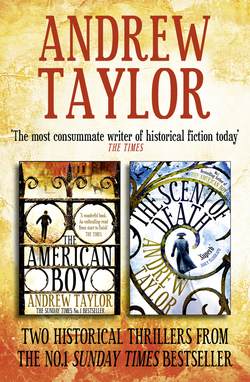Читать книгу Andrew Taylor 2-Book Collection: The American Boy, The Scent of Death - Andrew Taylor, Andrew Taylor - Страница 56
44
ОглавлениеHow could I have known that Mrs Johnson, for all her poverty and her retired situation, was a person of great importance in the drama unfolding around me? True, she was one of those creatures who find it difficult to dissemble their emotions. I suspected already that she disliked Mr Carswall. After the visit to Grange Cottage with Edgar, I was convinced that she also disliked Mrs Frant to the point of hatred. But at that stage I had no idea of the reason. Indeed, I blundered through this entire affair in a state of ignorance almost from start to finish.
As soon as Mrs Kerridge and Charlie arrived in the chaise, we bade our hostess farewell with almost indecent haste. Even with the seat in the middle pulled out, the chaise could take no more than three, so Charlie and I walked home through the park. As we went, I glanced back at the cottage in its ill-kempt garden.
“What are you looking for, sir?” Charlie asked.
“I thought I saw a man in the garden while we were in the cottage,” I said, knowing I must answer frankly because Edgar would tell him what had happened. “But Mrs Johnson was sure I was mistaken, and said there had not been a man about the place since she discharged the gardener in October. I saw only part of a face, and only for an instant. It might even have been a woman.”
“A housebreaker?” Charlie suggested. “Wouldn’t that be a lark, sir?”
“It’s unlikely to be a housebreaker in broad daylight, and with company in the house.” I smiled down at him. “More likely a beggar.”
When we reached the mansion, we found Edgar in the ladies’ sitting room. He was arranged on the sofa with Mrs Lee and Mrs Frant fussing over him, while Miss Carswall sat by the fire, glancing through a newspaper. The surgeon had been sent for but Mrs Lee shared my belief that the injury to the ankle was no more than a sprain; she brought out a host of anecdotes concerning the misfortunes of her sons, brothers, nephews and cousins to support the diagnosis. Certainly the boy looked better – his colour had returned and the face he turned towards Charlie and me was almost as lively as ever.
“I wish they wouldn’t fuss so,” he murmured to Charlie. “My ankle hardly hurts at all now if I do not put any weight on it. And we had not even begun to look for the treasure.”
All day I was restless. I could not forget the face I had seen at the window of Grange Cottage. I tried to persuade myself that it had been no more than a trick of the leaves and the light. I reminded myself that I had had no more than the briefest glimpse, and that Mrs Johnson was a rational woman who had no reason to lie.
I turned over in my mind whether I should mention my suspicions, insubstantial though they were, to Mr Carswall. In London he and I had established the possibility that Henry Frant was still alive, though the corpse at Wellington-terrace had been identified as his at the inquest and was now rotting under his name in the burying ground of St George the Martyr. Even if he had survived, however, he could not afford to run risks – he was a bankrupt, an embezzler, and very possibly a murderer too. But there was not a sliver of proof that he was still alive.
No proof: merely shadows glimpsed moving out of the corner of an eye, half-heard hints, a yellowing finger in a satchel left on a tooth-puller’s door. But there remained the possibility that the man at the window had been Henry Frant. I found myself pacing up and down the hall.
The library door opened a few inches. I heard the harsh tones of Mr Carswall’s voice, speaking so low I could not make out the words, and a reply in a higher, lighter voice that I recognised with a thrill of interest as Mrs Frant’s. I did not intend to eavesdrop and I was in the act of withdrawing, when suddenly they began to speak more loudly.
“Take your hand from me, sir,” cried Mrs Frant, and her words were followed by the sound of a sharp impact, perhaps a slap. “I would not entertain it for a moment.”
“Then you’re a damned fool, madam,” said Carswall. “Think who bought you that dress, who puts food in your belly, who pays for your son to grow up a gentleman.”
I drew back into the recess of a doorway. I no longer had any desire to confide my suspicions to Mr Carswall. Sophia Frant emerged from the library, her face blazing with colour. She ran lightly across the hall to the stairs. At the foot of them, she paused and glanced back. She saw me standing there. I wanted to say: I was not listening on purpose, I did not mean to pry. Also, I wished I might help her, for I had overheard enough to understand the nature of the conversation.
